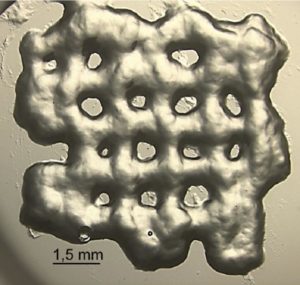
Scientists, including a team from the Spanish National Research Council (CSIC), say they have designed new hydrogels that allow the culture of T cells. These hydrogels can mimic lymph nodes, where T cells reproduce and, therefore, provide high rates of cell proliferation.
The researchers hope to be able to bring this new technology, for which a patent has already been filed at the European Patent Office, to hospitals soon, and whose first details “CCL21-loaded 3D hydrogels for T cell expansion and differentiation” are published in Biomaterials. Scientists have started a project that aims to print these new hydrogels in 3D and thus accelerate their transfer to the market.
“Recent achievements in the field of immunotherapy, such as the development of engineered T cells used in adoptive cell therapy, are introducing more efficient strategies to combat cancer. Nevertheless, there are still many limitations. For example, these T cells are challenging to manufacture, manipulate, and control. Specifically, there are limitations in producing the large amounts of therapeutic T cells needed for these therapies in a short period of time and in an economically viable manner,” the investigators wrote.
“In this study, three-dimensional (3D) poly(ethylene) glycol (PEG) hydrogels covalently combined with low molecular weight heparin are engineered to resemble the lymph nodes, where T cells reproduce. In these hydrogels, PEG provides the needed structural and mechanical properties, whereas heparin is used as an anchor for the cytokine CCL21, which is present in the lymph nodes, and can affect cell migration and proliferation.
“The 3D structure of the hydrogel in combination with its loading capacity results in an increased primary human CD4+ T cell proliferation compared to the state-of-the-art expansion systems consisting of artificial antigen-presenting cells. Thus, we present a new tool for adoptive cell therapy to help achieve the large numbers of cells required for therapy of selected phenotypes targeted against cancer cells, by mimicking the lymph nodes.”
The polymer provides the structure and mechanical properties necessary for T cells to grow, while heparin is used to anchor different biomolecules of interest, such as cytokine CCL21, a protein present in the lymph nodes and which has a major role in cell migration and proliferation.
Cancer immunotherapy is based on using and strengthening the patients’ immune system so that it recognizes and fights tumor cells, without damaging healthy tissues. One of the possible treatments, the so-called adoptive cell therapy, consists of extracting the T cells from the patients, modifying them to make them more active, making numerous copies of them, and injecting them back into patients.
“This personalized therapy, although still very novel, seems to have more lasting effects than current oncological therapies, thanks to some T-lymphocytes that are capable of conferring immunity over time,” pointed out one of the creators of this technology, researcher Judith Guasch, PhD, from the Institute of Materials Science of Barcelona (ICMAB-CSIC).
“Its application is limited by the current cell culture media, since they are not effective enough for the proliferation and growth of a relevant amount of therapeutic T cells in a short time and in an economically viable way.”
To continue the study and encourage the transfer of this technology to the market, Guasch and Elisabeth Engel, PhD, professor at the Polytechnic University of Catalonia (UPC) at the Institute of Bioengineering of Catalonia (IBEC), have recently been awarded a project from the Call for Transfer and Valorization Projects of the Biomedical Research Networking Center-Bioengineering, Biomaterials and Nanomedicine (CIBER-BBN) 2020, aimed at carrying out projects for CIBER-BBN groups with the interest and support of companies.
The aim of the project is to print large 3D hydrogels compatible with clinical bioreactors to expand T cells in a more efficient way. The researchers will develop the prototype in the laboratory and make the first experiments for validation in the clinical phase. Currently, the project is looking for industrial partners, mainly biomedical and pharmaceutical companies, and investors interested in creating a spin-off company to transfer this technology and make it available in hospitals.
"allow" - Google News
September 01, 2020 at 03:00PM
https://ift.tt/2YTYGUI
Novel Hydrogels Allow T Cells to Grow for Immunotherapy - Genetic Engineering & Biotechnology News
"allow" - Google News
https://ift.tt/2KTEV8j
https://ift.tt/2Wp5bNh
Bagikan Berita Ini















0 Response to "Novel Hydrogels Allow T Cells to Grow for Immunotherapy - Genetic Engineering & Biotechnology News"
Post a Comment